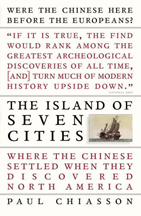This book got inside of my head because it was convincing enough to make me question some of the history that I've previously taken for granted. I just didn't know what to make of it. Certainly, I found the history of Cape Breton that is explored in the first part of the book very interesting because I was never really aware of how important the island was for the first Europeans on the continent. The later sections of the book were more problematic. In the latter parts, information about the architectural 'ruins' of the site Chiasson has found, and cultural knowledge and textile patterns that seem to be unique to the Mi'qmak are sited as evidence of Chinese settlement on the island before Europeans (sometime around 1421).
While it seemed to me like some of the similarities are striking (particularly the clothing patterns as compared to traditional Chinese dress) there isn't any of the evidence one might expect to find of human settlement. I tried looking on the internet for more evidence of Chinese settlement on the coast of Cape Breton but there was not much more then book reviews on the Seven Cities. That in itself raises questions about why archeologists haven't investigated further. Perhaps they know something that the author of the book is overlooking. It is also possible that the wheels of science turn slowly and there is lag time on exploring new ideas that run counter to what is commonly held knowledge. However, it seems like this would be an exciting avenue for further research if it was legitimated by artifacts of daily and industrial life as Chiasson is suggesting. It would also mean all but a few sparse accounts of the 'ruins' have been successfully covered up or 'forgotten' in both European and Chinese history, which doesn't seem likely.
In any case, it was interesting to wrap my mind around this possibility. I did think the similarities of dress and other cultural knowledge type evidence was compelling. It suggests that there was some kind of contact that little is known about but I doubt the scale of the settlement Chiasson claims. Now that it is on my radar, though sceptically, I will certainly keep my ears open to new information on the topic.
2 days ago


History is such a sloppy concept; a messy amalgamation of guesswork and creative assumption. Too bad its so important. Books like this are either briliant or sinister..... is the author trying to make a name for himself or beating down the status quo. I hate not knowing....
ReplyDeleteA German Eduard Gans visited Bentham the year before he died, and confessed he was dedicated to the study of history. Bentham replied:
ReplyDelete"Do you still have some regard for history, that crutch of inanity, that sheet of paper on which understanding and stupidity are equally inscribed, and where the latter often takes the victory. Look at our prejudices, our follies, our delusions, and our 'progress' and then tell an Englishman that you love history.
Nevertheless, here is precisely where i would say i do, I replied, for while nowhere else in Europe we find as many old and deep-rooted privileges as here, nor is there another country where these historical survivals seem so venerable-- seem so characteristic and so enticing.
Pah. Let us go for a walk in the garden. History modifies itself while one walks, he added derisively."
The more we learn, the more it seems the inanity has ruled-- and just as you find this is such a shame because the reality is so much more interesting!